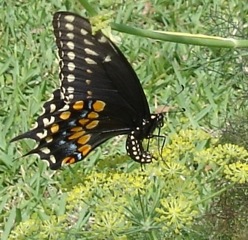
Even if you don’t cook with herbs there is another terrific reason for growing herbs for bugs in your garden and yard.
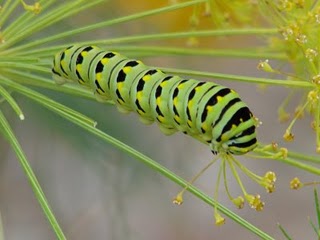
The flowers attract beneficial insects and butterflies. If you grow any of the plants in the Umbrilliferae family: dill, parsley, fennel- the butterflies come and lay their eggs on the plants so the hatching larva have something to eat. Those larva, the caterpillars, of course, can decimate a plant in no time. But, we get butterflies in exchange, and generally the plant recovers.
Other insects, many of them beneficial to our gardens, are attracted to herb flowers, too.
The following was posted by “Honey Gal” at Organic Consumers Association’s web forum years ago, but it’s relevant today: “I’m a beekeeper and teach classes in bee stewardship. One thing folks can do to help, even if you aren’t a beekeeper, is to make your yard bee friendly. Plant a flowering herb garden.
Bees use herbs medicinally and your plants can help make a difference. I suggest rosemary, sage, THYME (lots of it), marjoram, chives, basil, all the mints and other herbs with flowers. Bees will find them. To do more, plant native flowering bushes, too. In our area (WA) spirea and goldenrod are bee magnets. Try to have flowers in bloom through into fall.
Put out a big shallow dish of water with sticks or moss in it (so they don’t fall in) and keep it moist. If you can get seaweed, bees are particularly fond of the minerals so I keep a little pile of seaweed in the “bee pond.” All these small actions add up and make it a little easier on your local bees.”
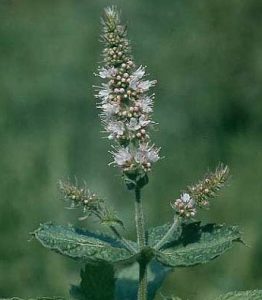
Low growing plants such as mint and thyme act as cover for ground beetles which are good predators for lots of tiny pests. These low plants also provide shady, protected areas for laying eggs.
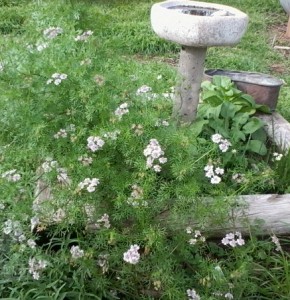
Tiny flowers, like plants from the Umbelliferae family: fennel, angelica, cilantro/coriander, dill, Queen Anne’s Lace, yarrow, and rue will attract tiny beneficial wasps.
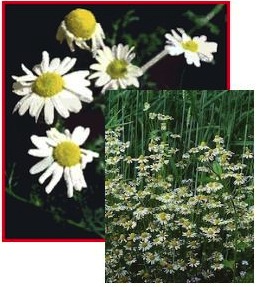
Composite flowers (calendula and chamomile) and mints (spearmint, peppermint, lemon balm, catnip) will attract predatory wasps, hover flies, and robber flies.
Attract the above mentioned beneficial insects to combat the following:
- Parasitoid wasps – feed on aphids, caterpillars and grubs
- Lacewing larvae – feed on aphids
- Ladybug larvae – feed on aphids
- Ground beetles – feed on ground-dwelling pests.
- Hover flies, and Robber flies – feed on many insects, including leafhoppers and caterpillars
Many common pests in gardens can be deterred by interplanting herbs among and along vegetables and in flower gardens. This practice eliminates the need for harsh pesticide use around your food crops and your family and pets.
The following list will give you some basic information regarding which herbs to plant to deter the pests that can plague your garden.
Aphids – Chives, Coriander, Nasturtium
Ants – Tansy- not useful for Fire Ants in the South
Asparagus Beetle – Pot Marigold (Calendula)
Bean Beetle – Marigold, Nasturtium, Rosemary
Cabbage Moth – Hyssop, Mint (also clothes moths), Oregano, Rosemary, Sage, Southernwood, Tansy, Thyme
Carrot Fly – Rosemary, Sage
Flea Beetle – Catmint (Contains nepetalactone, an insect repellent. Steep in water and spray on plants.), Mint
Flies – Basil, Rue
Fruit Tree Moths – Southernwood
Japanese Beetles – Garlic & Rue (When used near roses and raspberries), Tansy
Potato Bugs – Horseradish
Mosquitoes – Basil, Rosemary, Lemon Grass
Moths – Santolina
Nematodes – Marigold (Marigolds should be established for at least 1 year before their nematode deterring properties will take effect.)
Savory, Winter – Some insect repelling qualities Squash Bugs & Beetles – Nasturtium, Tansy
Ticks – Lavender (Also thought to repel mice and moths.)
Tomato Horn Worm – Borage, Pot Marigold
You can find many of the plants mentioned here at The Herb Cottage or , out and about at Markets and Garden events.
I hope you can use this information to better plan your next garden, whether it will be in the spring or next fall and winter, for those of you who live and garden in the South and West where mild winters allow for gardening. In mild winter areas pests are not killed off by the cold and freezing weather and can be a problem year round.
QUOTE FOR THE MONTH
I tore myself away from the safe comfort of certainties through my love for truth — and truth rewarded me. -Simone de Beauvoir, author and philosopher (9 Jan 1908-1986)
